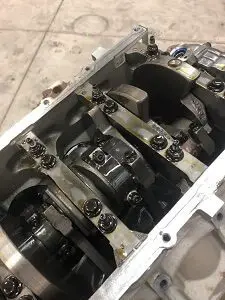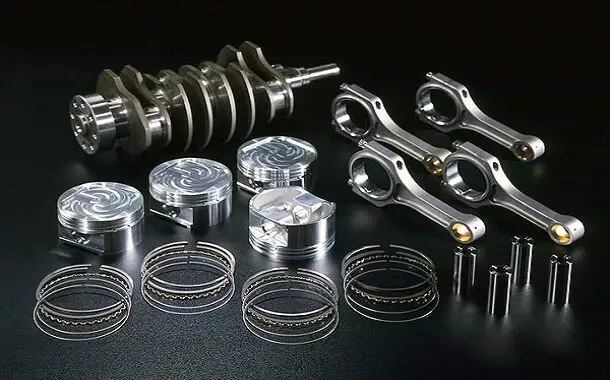Spun Bearing Repair Cost
Last Updated on February 21, 2024
Written by CPA Alec Pow | Content Reviewed by ![]() CFA Alexander Popinker
CFA Alexander Popinker
Most drivers will encounter a situation in which one or more bearings of the car will malfunction, with less or more serious effects. These problems are generally difficult to identify because these parts are inside other mechanisms and are not visible.
An engine’s rod bearing which has lost its lubrication on the crank can be described as a spun bearing. This manifests as a crank spinning with the bearing, instead of inside of it. This problem can occur at a wide variety of car engines like diesel, gasoline, racing, and stock.
While repairing a spun bearing you will have to fix other engine problems as well and some of the most popular issues are the rod journal repairs, the connecting rod repairs, the crankshaft repairs, and the rod bore repairs.
How much does it cost the spun bearing repair cost?
Spun bearing repair costs are influenced by many factors including the geographical location, the type of repair, the cost of the other parts that have to be repaired or replaced, the labor costs, the mechanic that does the job, and the make and model of the car.
The average cost of repairing a spun engine bearing is around $2,550, including the parts and the labor expenses. Usually, you will have to replace or repair parts like the cylinder head bolts, pistons, gaskets, crankshafts, engine cooler lines, and some more.
In order to better understand the costs of a spun bearing repair, we will split them into additional categories.
The average price of a spun bearing repair
As already mentioned above, the average cost of a spun bearing repair is almost $2,550, including the parts and the labor.
The average costs of some of the most popular spun bearing related repairs
 When you will have to repair a spun bearing you will have to repair some other parts as well such as the cooler lines, the camshaft bearings, the head gaskets, the crankshafts, the connecting rod bearing, the cylinder head bolts, and the pistons.
When you will have to repair a spun bearing you will have to repair some other parts as well such as the cooler lines, the camshaft bearings, the head gaskets, the crankshafts, the connecting rod bearing, the cylinder head bolts, and the pistons.
Cooler line replacement cost
One of the cheapest jobs related to spun bearing repair is the cooler line replacement job. Expect to pay around $230 on average in order to replace an engine oil cooler, where the price of the parts is less than one hundred dollars and the labor will be closer to $130.
Camshaft replacement cost
You will have to replace the entire camshaft if the camshaft bearings are very damaged. Be prepared to pay around $1,500 on average for a camshaft replacement, where the parts cost around $480 and the labor costs are around $1,020.
Head gasket replacement cost
Usually, the head gasket is the main gasket that is replaced in an engine. The average replacement cost is around $1,700, where the expenses for the parts are almost $500 and the labor costs are around $1,200.
Crankshaft replacement cost
Another important car part that may have to be replaced while repairing a spun bearing is the crankshaft. Expect to pay around $1,700 for the crankshaft, where the parts are around $1,100 and the labor expenses are around $600.
Cylinder head replacement cost
You might also like our articles about the cost of engine camshaft, head gasket repair, or port and polish heads.
Be prepared to spend around $3,300 in order to replace a cylinder head in a car, where the expenses of the parts are around $2,000 and the labor expenses are around $1,300.
Average Cost of Repairs Based on Type of Vehicle
As the spun bearing repair involves the repair or replacement of other engine elements, the final costs will greatly depend on the make and model of the car. Here is a list of average costs for different types of cars. This was made based on the rates charged in Columbus, Ohio because this geographical location is the most representative of the average car labor cost in America.
- $4,300 for a camshaft replacement for a 2018 Cadillac Escalade
- $3,300 for a head gasket replacement for a 2015 Ford F-150
- $380 for a cooler line replacement for a 2018 Cadillac Escalade
- $3,600 for a head gasket replacement for a 2013 Toyota Camry
- $1,850 for a head gasket replacement for a 2018 Cadillac Escalade
- $2,420 for a camshaft replacement for a 2013 Toyota Camry
The average cost of labor for a spun bearing repair
We have to take a look at the cost differences throughout the entire United States in order to better understand the labor expenses for a spun bearing repair. Also, we must take into consideration the necessary amount of time needed in order to repair a spun bearing.
A spun bearing repair job may take anywhere between 10 and 20 hours, depending on the type of repair and any related repairs. However, the average time would be around 15 hours.
Auto Chimps claims that in the United States vehicle labor costs are influenced by many factors such as the make and model of the car, the geographical area, the type of repair shop, and much more. Anyway, you should expect an average cost per hour of almost $105.
For instance, the highest rates for car labor are charged in Georgia, while in Vermont these costs are the lowest. Here is a list of the average costs of labor for car repairs in different U.S. locations:
| State | LABOR Cost |
|---|---|
| Vermont | $125 |
| California | $155 |
| Pennsylvania | $150 |
| Georgia | $156 |
| New Hampshire | $136 |
| Hawaii | $142 |
| Arkansas | $158 |
| Utah | $149 |
| Rhode Island | $139 |
| Mississippi | $162 |
| Texas | $153 |
What are the extra costs?
In case you will have to order some car parts online in order to repair a spun bearing you will have to pay the delivery fees.
Important things to consider
Some of the main causes of a spun bearing include excessive heat endurance supported by your vehicle, heavy loading, and transportation, particles within the engine’s oil, loss of oil pressure, and lubrication.
How can I save money?
You may save some money if you are looking for some price offers when you are ordering the car parts online. Also, there are auto repair shops that may offer some discounts.


Leave a Reply
Want to join the discussion?Feel free to contribute!